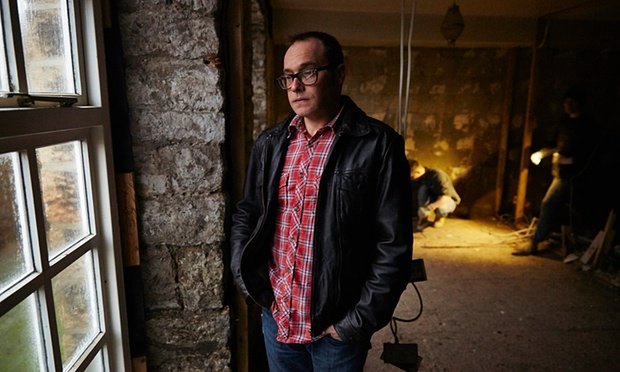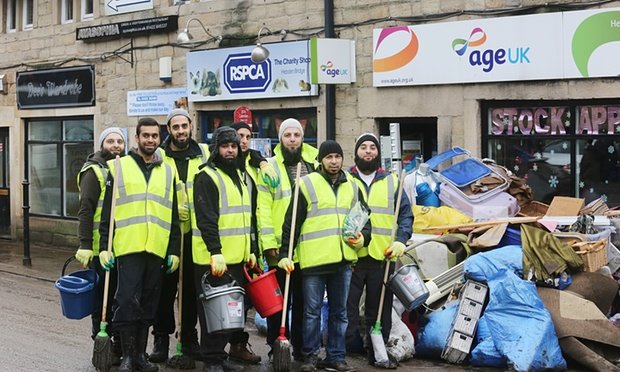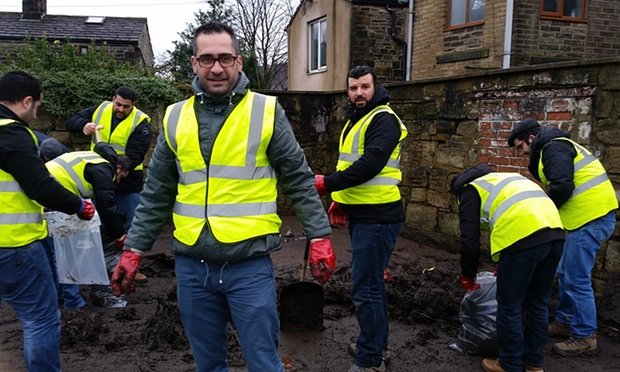|
The impact of the floods in the north of England and Scotland has been enormous. Yet the disaster has brought together people who might never normally mix – from the armies of Sikh and Muslim volunteers to the individuals sending care parcels • Life is slowly returning to my village – a resident reports |
 |
| Volunteers from Khalsa Aid, giving out food to villagers in the flood-hit Lancashire village of Croston. Photograph: Lauren Brown/PA |
Tuesday 5 January 2016: The Sikhs had been dishing out free curry in Mytholmroyd for a few days when a man in his mid to late 20s came up to them, looking emotional. He had a confession to make. “I used to hate Asians,” he told one of the coordinators from Khalsa Aid, a Sikh charity based in Slough, who came up to volunteer in the West Yorkshire town after it was almost wiped out in the post-Christmas floods. “I used to be with Combat 18. But I’m so ashamed of that now, having seen how you are all up here helping us.” He vowed to go and apologise to all the Asian shopkeepers he had been rude to over the years.
“These floods have changed people,” says Ravi Singh, Khalsa Aid’s CEO, as his volunteer army diverted resources up to Deeside in Scotland, which flooded earlier this week. “It’s been incredibly inspiring to see how people of all backgrounds have come together. There was no twiddling thumbs waiting for the government or authorities to help. They rallied around and they got stuck in. I think the experience will have a long-lasting effect on these communities.”
Mark Slade would agree. His riverside flat up the valley in Sowerby Bridge was destroyed on Boxing Day when the Calder burst its banks and invaded his ground-floor home. He was fast asleep in bed when the firemen banged on his door. “I threw some jeans on and prepared to give whoever it was merry hell,” says the 46-year-old. “Then I saw it was the fire service. They told me I was about to get flooded. When we got outside, the water was already 5ft deep. The firefighter had to give me a piggyback.”
Even then, Slade didn’t think his flat was in danger, so he didn’t take anything with him. He left his phone on the side, assuming he could pop back later to get it. But when he did return, three hours later, the waters had completely engulfed the ground floor, right up to his ceiling. Everything he owned was destroyed.
 |
| Mark Slade inside his flat in Sowerby Bridge, destroyed by the flood on Boxing Day. Photograph: Christopher Thomond for the Guardian |
On Sunday night, he logged on to Facebook for the first time in his life. “Hi, my name’s Mark and I lost everything I own in the Boxing Day floods,” he wrote.
Within an hour, he’d had 80 offers of help from people he had never met in his life, prompting his second-ever Facebook post. “Incredibly overwhelmed by the response, not too proud to say tears have been shed over the well wishes and offers of support, again from strangers. I have to admit, I was a single, cynical man, living in his hometown of Sowerby Bridge, a town I barely recognise from my youth and I felt a huge disconnect. I felt no sense of society or belonging [to] the town where I was born. And it took a tragedy, at a time when most people focus [on] their own families. And yet, without request or reward, people have put their backs and hearts into helping strangers. It took a tragedy to bring a dawning of a new year with more hope for myself than I have felt in a long time, all thanks to a community I didn’t believe existed. I’m ashamed to say I thought Britain was broken. I’m now proud to say the scales have fallen from my eyes and now I see.”
The bank worker is still crying when he describes how the floods have changed his life for the better. “It’s really, really affected me. It’s almost like I’ve been given a clean slate. The floods have made me look at myself very, very critically, at how I interact with people, how isolated I had become.” He had become so disillusioned with Sowerby Bridge that he had turned in on himself, he says. “The buildings were the same, but everything else had changed. Everywhere you go, people were swiping left and right, looking down at their phones and not saying hello. I became more and more isolated, more and more cynical, shouting at the TV and looking forward to Newsnight so I could have a good old rant. I felt totally disconnected from society. I didn’t think anybody cared.”
In losing everything, he has found hope and a sense of community he thought had been consigned to history, along with Sowerby’s textile industry. Today, he was expecting a visit from a stranger who has promised to drop off a suit for him to wear when he goes back to work. A woman he has never met, whose own home had been flooded in Shropshire in the past, promises to send him a care parcel. “I’m not normally a man who cries but, in the past 48 hours, I’ve cried so much that I’m desiccated. Liquid is seeping out of me,” he says with a sniffle. He returned to the flat with the Guardian’s photographer today for the first time since he left. He found a shell of a building, the internal walls removed, a solitary crystal light fitting hanging from the ceiling the only remainder of his home. “This is not the flat I left,” he says sadly.
 |
| Volunteers from Rossendale Unity Welfare Society helping in the clean-up opperation in Hebden Bridge. Photograph: Barbara Cook/Demotix/Corbis |
While the floods helped restore Slade’s faith in people, they did show up the cruelty of a minority of others. In West Yorkshire, father and son Paul and Sam Gibbons returned to the flooded Todmorden premises in which they share businesses to find that a collection of bikes worth £20,000 had been stolen from Sam’s bike shop, Cycle Factory. Paul’s firm, NR Components, which makes caravan awnings, had already lost about 30 sewing machines worth £6,000 each in the initial flooding.
A week on, he cannot believe that anyone would be so callous. “The thieves took advantage of the fact that the power was off, so the CCTV wasn’t working and nor was the alarm. It makes you think these people know what they are doing. The only comfort we can gain from this is that people care. A hundred thousand people saw our Facebook post about the theft. All over the country people are trying to help us.”
Rachel Burton, the head teacher of Riverside junior school in Hebden Bridge, is in a reflective mood as she continued a huge clear-up operation. The town is often mocked for its surfeit of vegans and crystal healers, a stereotype upheld when free healing gong sound baths were offered to all flood victims by one yoga studio last week. Hebden is a “white bubble”, says Burton, a former police officer. The floods may have changed that for the better, she says, after huge numbers of people from Muslim and Sikh groups arrived in the town to help with the clear-up.
Riverside’s entire ground floor was deluged when the Calder flooded, destroying the kitchen that caters for five schools in the valley and ruining the parquet wood flooring that has been a centrepiece of the building for more than 100 years. With Storm Frank still raging last week, a mosque in Halifax sent scores of volunteers to Riverside, with a Sikh temple following the day after.
“It’s a very white bubble, but this has been amazing. For me, as head of the school, what an opportunity,” Burton says.
“I think it will change the children of the community in the long-run. They are very educated and free-thinking, there are no boundaries because their parents are not racist or prejudiced, but it’s very nice for a bubble of a community to actually see what’s going on. That’s great for my kids.”
When the school reopens, she will tell the children that it was members of the wider community who helped pick their school up when it was down. “We will tell the children: ‘The community did this.’”
In Mytholmroyd on New Year’s Day, locals were stunned to see a group of Syrian refugees from Manchester turn up to shovel mud from the playground at the Burnley Road Academy, a primary school that was almost destroyed during the Boxing Day floods. When the new term starts on Wednesday, the upper school will be squatting in the sixth-form centre of nearby Calder High, while the little ones will take over classrooms in another primary.
 |
| A group of Syrian refugees helping out with flood efforts in Hebden Bridge. Photograph: Rethink Rebuild Society |
Yasser al-Jassem, a refugee who escaped Syria a few months ago, explains why they were there: “I volunteered when I was in Aleppo. I was an ambulance driver and helped with humanitarian rescue efforts when the Assad regime bombed civilian areas. Now, in the UK, I also want to volunteer, and so do many other Syrians who recognise the importance of humanitarian efforts like this one because of the destruction in our homeland.”
The group also filled sandbags in Littleborough, Rochdale. “It’s extremely uplifting, both for us and for the community which we helped,” says Al-Jassem. “With everything that is happening in our homeland, it is nice to be helping where we can.”
On Sunday, a special interfaith service was held at St James’s church in Hebden Bridge, attended by Muslim charities and Khalsa Aid, which dished out 6-8,000 hot meals across Yorkshire, Lancashire and Cumbria last week. A Muslim youth charity, the Ahmadiyya Muslim Youth Association, said its 350 volunteers had worked 7,400 hours over the Christmas period, helping 10,000 people in 38 towns and villages.
Despite the optimism in many quarters, others feel distinctly gloomy about the future of these flooded towns. Some business owners say they may never reopen, facing massive repair bills after being unable to buy flood insurance. Others are determined to soldier on.
In Keswick, in the north Lakes, the ground floor of Amos Doron’s bike shop was totally flooded on 6 December, destroying up to £70,000 of stock. New glass barriers built on the nearby Greta bridge were supposed to stop the river spilling over into the town but they failed following record rainfall in early December.
Last week, as the river rose once more, Doron looked nervously out of the window of Keswick Bikes to see if he was likely to spend the new year shovelling silt out of the shop. Staff and volunteers had spent the previous few weeks doing just that, before selling off spoiled stock at super-cheap prices, and making the ground floor “sacrificial”.
“We have to accept that the shop will flood again, and so we have designed what we are calling the sacrificial part, which should only take a day to clear up. There will be a concrete floor with rubberised tiles you can unclip and wash and put back on,” says Doron. “We don’t have the luxury of not trading, so we need to be back up and in business as soon as possible.”
